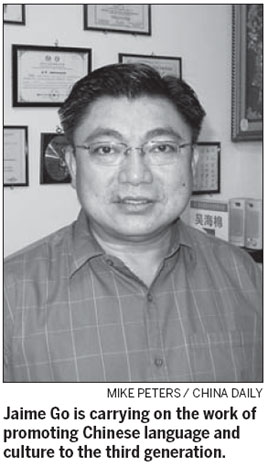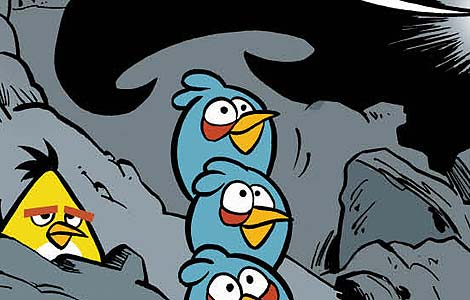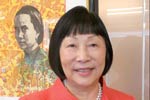Educating the third generation
Updated: 2011-09-25 07:57
By Mike Peters (China Daily)
|
|||||||||
Philippines
Jaime Go's face breaks into a broad smile as he watches his students limber up with morning exercise after the 7 am flag raising at his school.
"A fit body means a fit mind," says Go, the principal at Santiago Cultural Institute in the Philippines' Isabela province on Luzon island. It's not enough to park students at their desks for lessons, he says, looking on as the kindgergarten class dances to Shakira's This Time for Africa. Activity is important not only to keep them fit, he says, but to keep them from being dull.
The school was founded in 1948 by a group of local Chinese business leaders including Go's father, Wu Majian, with the help of the Filipino-Chinese Chamber of Commerce in Manila. Wu Majian came to the area from Fujian province, like 95 percent of the Chinese community here, while Go's mother is Filipina.
Go says the early days of the school were "nipa," alluding to the palm thatch used for temporary building materials. When the numbers grew, the school's board rented a wooden house. Later a 7,000-square-meter lot was purchased, and the community raised the funds to build the current classroom and dormitory buildings.
"We've got 205 students here, with 16 English teachers and 8 Chinese teachers, including me!" says Go, who teaches Chinese to students with special needs.

"Our students are as young as 3, and we have a class for every grade level through the four years of high school." Most of the students are ethnically Chinese, but not all.
Go says the school came about for reasons that are common in the Chinese Diaspora.
"In my generation, with a first generation immigrant father, children learned Chinese from their parents, who were strict about that: We spoke Chinese in the house and we used chopsticks to eat our meals."
Parents like his father were frustrated when they heard their kids speak the local dialect Tagalog, he says, but not out of disrespect to Filipinos. They were just eager to preserve their own language and culture in the community.
"So the second generation inherited all Chinese culture," he says. "We could read, write and speak Chinese and we knew our history."
But for the third generation it was quite different. "Their parents don't want to be so strict with them, and they usually don't want their kids scolded by teachers, either. So the children get pampered."
For the third generation, Tagalog and other local influences are greater from birth, and that makes the mission of Go's school more important than ever, he says.
"Chinese is becoming more attractive in the community because people are aware of the Chinese boom. But it can be an uphill battle. Many students speak Tagalog and English well but not Chinese, and the Philippines has been steeped in US tradition and culture since the US wrested the islands from Spain in colonial times."
That influence is great. Go says he often hears young people say, "If I have the time, the money and the opportunity, I will go to America."
That just makes him more determined in his mission. A former mechanical engineer and manager, he was recruited to be the school's principal when the board decided it was growing so fast that a professional manager's skills were essential. Go's roots in the school are deep, since he is an alumnus as well as the son of a founder.
"I got six months special training in education management, and now I've been here 6 years," he says as he takes the short walk from his office to the campus dormitory where he lives with his wife and two sons, who are enrolled in grades 2 and 6.
"I like it very much - I really feel like I serve the people."
China Daily
(China Daily 09/25/2011 page4)










